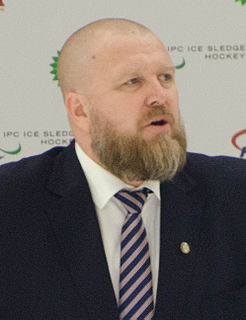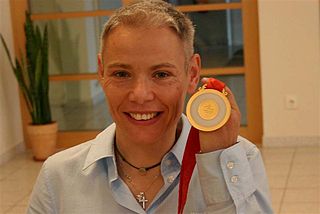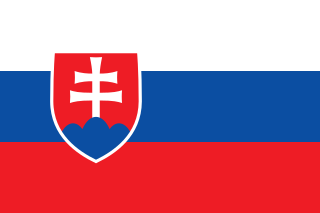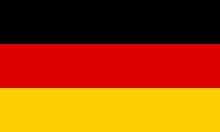
The 1998 Winter Paralympics, the 7th Paralympic Winter Games, were held alongside the Winter Olympics in Nagano, Japan from 5 to 14 March 1998. They were the first Paralympic Winter Games to be held outside Europe. 571 athletes competed in Nagano; it remains the highest number of athletes competing at any Winter Paralympics.

Tommy Rovelstad is a Norwegian sledge hockey player.

Martin Braxenthaler is a German monoskier and Paralympian. He has participated in alpine skiing at four Winter Paralympic Games, in 1998, 2002, 2006 and 2010. He won a bronze medal at the 1998 Winter Paralympics, four golds at the 2002 Games, three more golds at the 2006 Torino Paralympics and three golds and one silver at the 2010 Vancouver Paralympics.

Netherlands competed at the 1998 Winter Paralympics in Nagano, Japan. The team included 3 athletes, 2 men and 1 women. Competitors from Netherlands won 2 medals, including 1 silver and 1 bronze to finish 20th in the medal table.

Armenia made its Paralympic Games début at the 1996 Summer Paralympics in Atlanta, with just two entries: Gagik Gasparian in powerlifting, and a four-person team in the mixed crewboat event in sailing. Two years later, Armenia made its Winter Paralympics début, with eight competitors in alpine skiing. The country has participated in every subsequent event of both the Summer and Winter Paralympics, although its delegations have generally been small.

Germany (GER) participated in the inaugural Paralympic Games in 1960 in Rome, where it sent a delegation of nine athletes. The country, since 1949 officially the Federal Republic of Germany (FRG), was until 1990 also called West Germany while the separate East German Democratic Republic (GDR) existed, which was recognized by the IOC only after 1964. East German athletes, however, participated in the Paralympics for the first and last time in 1984. Following the reunification of Germany in 1990, athletes from all of Germany compete simply as Germany (GER) again.

The Austrian Paralympic Committee was founded in 1998. Since April 2009 the former Austrian Minister of Health, Youth and Family and former NPC Vice President Maria Rauch-Kallat was elected as President. One of her main goals is to support youth and women with disabilities. Petra Huber takes over the responsibility of Secretary General, the two Vice-Presidents are Hermann Krist and Brigitte Jank.

The Netherlands participated in the inaugural Paralympic Games in 1960 in Rome, where it sent a delegation of five athletes. The country has participated in every subsequent edition of the Summer Paralympics. It made its Winter Paralympics début in 1984, and has taken part in every subsequent edition of the Games, except 2006. The Netherlands was the host country of the 1980 Summer Paralympics, in Arnhem.

Ukraine made its Paralympic Games début at the 1996 Summer Paralympics in Atlanta, with thirty athletes competing in archery, track and field, powerlifting, swimming, and sitting volleyball. Vasyl Lishchynskyy won Ukraine's first Paralympic gold medal, in the shot put, and Ukrainians also won four silver medals and two bronze. Ukrainians had previously participated within the Soviet Union's delegation in 1988, and as part of the Unified Team in 1992. Ukraine, following its independence from the Soviet Union, missed out on the 1994 Winter Games, but made its Winter Paralympics début at the 1998 Winter Games in Nagano. Ukraine has competed at every edition of the Summer and Winter Games since then and have done so with remarkable success.

Andrea Eskau is a German handbiker, Paralympic biathlon, and cross country skier who was born in Apolda and was a winner of three gold medals in Summer Paralympic games. In 2014, she became a recipient of another gold medal at the 2014 Winter Paralympics in Sochi, Russia. In 2013, she was a cross-country sit skiing winner at the IPC Nordic Skiing World Championship. Eskau also competed at the 2016 Paralympic games in Rio de Janeiro winning a gold medal in the H5 Cycling road race and taking home a bronze medal in the H4-5 time trial. In 2018, Eskau went on to compete at her third Winter Paralympmics and won gold in both the 10km and 12.5km sitting biathlon.

Canada competed in the 1998 Winter Paralympics in Nagano, Japan from March 5 to 14, 1998. 32 athletes were sent by the Canadian Paralympic Committee to compete in three sports. Canada won a record of 15 medals at that time and finished fifteenth on the medal table.

United States competed at the 1998 Winter Paralympics in Nagano, Japan. 49 competitors from United States won 34 medals including 13 gold, 8 silver and 13 bronze and finished 3rd in the medal table.

Japan competed at the 1998 Winter Paralympics in Nagano, Japan. 67 competitors from Japan won 41 medals including 12 gold, 16 silver and 13 bronze and finished 4th in the medal table.

Austria competed at the 1998 Winter Paralympics in Nagano, Japan. 34 competitors from Austria won 34 medals including 7 gold, 16 silver and 11 bronze and finished 8th in the medal table.

Belarus competed at the 1998 Winter Paralympics in Nagano, Japan. 5 competitors from Belarus won no medals and so did not place in the medal table.

Norway competed at the 1998 Winter Paralympics in Nagano, Japan. 43 competitors from Norway won 40 medals including 18 gold, 9 silver and 13 bronze and finished 1st in the medal table.

Russia competed at the 1998 Winter Paralympics in Nagano, Japan. 35 competitors from Russia won 31 medals including 12 gold, 10 silver and 9 bronze and finished 5th in the medal table.

Slovakia competed at the 1998 Winter Paralympics in Nagano, Japan. 18 competitors from Slovakia won 10 medals, 6 silver and 4 bronze, and finished 18th in the medal table.

Germany competed at the 1994 Winter Paralympics in Lillehammer, Norway. 43 competitors from Germany won 64 medals including 25 gold, 21 silver and 18 bronze and finished 2nd in the medal table.
Juergen Egle is an Austrian para-alpine skier. He represented Austria in alpine skiing at four Winter Paralympics: in 1998, 2002, 2006 and 2010. In total he won one gold medal, three silver medals and two bronze medals.

















